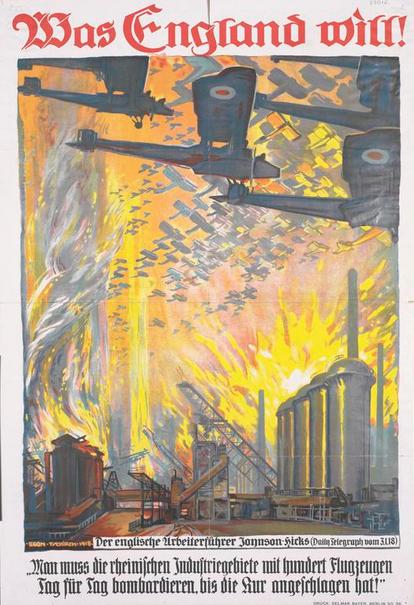Prophetic German Poster, 1918 August 7, 2014
Author: Beach Combing | in : Contemporary , trackbackGreat War posters are often, say it quietly, not very good. Nations had just not had enough experience at propagandizing young men when war broke in 1914 and even the best poster makers – the Americans? – still put out plenty of numbers that would make advertising execs pale today. However, the combatant states learnt and by the end of the war there were some eye-catching pieces. Take this extraordinary example, from early 1918 and Germany: a time and a place you did not want to live. Perhaps it was prepared for Operation Michael (the last great offensive in the west for the German army) or perhaps it was pasted on strassen to steel the home front as the Germany junta (all pretence of democractic rule had died by 1918) prepared for the inevitable reckoning on its borders and in its dockyards and factories.
The German legend is in those Gothic letters that make Beach’s eyes melt but here goes:
Was England will!
[What England wants!]
Der englische Arbeiterführer Joynson-Hicks (Daily Telegraph vom 3.1.18)
[English Labour leader (?) Joynson-Hicks (Daily Telegraph 3, 1, 1918)]
‘Man muss die rheinischen Industriegebiete mit hundert Flugzeugen Tag für Tag bombardieren, bis die Kur angeschlagen hat!’
‘We must bomb the industrial Rhineland with a hundred planes a day, until the cure has worked!’
In the Second World War there was little comment on the newspapers of enemy powers. But in the Great War the various European powers (and their presses) constantly quoted from hostile newspapers to prove this or that about worsening morale or the ruthless mercenary ways of those in the trenches opposite. In itself then a quotation from Joynson-Hicks is not that strange. The quotation does not appear in any database known to me, though presumably it is accurate: drbeachcombing AT yahoo DOT com (note that 3 October 1917 JH talked about hundreds of RAF planes bombing German Rhine towns and munition centres: the origin of the quotation or was the man a stuck record?) The only ‘lie’ on the poster is that Joynson-Hicks was a ‘Labour Leader’ whatever that means. Joynson-Hicks was, in fact, so far from being a friend of labour that he became Tory Home Minister in time for the General Strike in 1926, when he would doubtless have given his right hand for some Freicorps to patrol the streets.
What is remarkable is the Wellsian vision of the artist. These are bi-planes but painted from ground zero they look like WW2 fighters. Of course, even a hundred Great War planes could only do limited damage: all the German planes and airships that strayed into British airspace 1914-1918 killed just over a thousand; there are German machine guns that killed more Britons in an afternoon on the Western Front. But there is something eerily prophetic about the vision, certainly something disturbing. Whether it really did home morale on the Rhine any good is also a nice question. Beach would have packed up and moved his family to pre-birth Poland.



